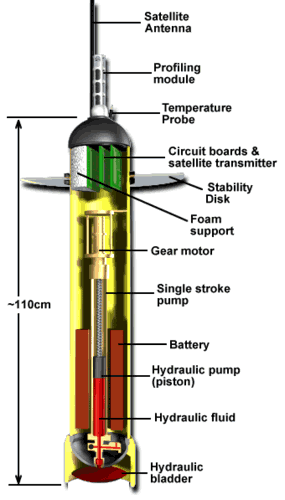Argo floats
Argo floats are profiling floats for obsering temperature, salinity, currents, and bio-optical properties in oceans. The international Argo programme; it has been operational since the early 2000s. The real-time data it provides is used in climate and oceanographic research.[1][2] A special research interest is to quantify the ocean heat content (OHC).
FMI operates three Argo floats in the Baltic Sea, two in the Bothnian Sea and one in the Gotland Basin. These Argo floats have been adapted to shallow water conditions.
One Argo-float is measuring temperature and salinity profiles in the Bothnian Sea daily, the two others are equipped also with oxygen and chlorophyll-a sensors and measure their profiles weekly.
Argo is an international observation system for observing temperature, salinity, and currents in the Earth's oceans, which has been operational since the early 2000s. The observations are based on free-drifting profiling floats, operating autonomously for extended periods and delivering their data via satellite connection when visiting the surface.
More than a million profiles have been measured, and currently there are more than 3500 active Argo floats in all oceanic areas.
Contacts:
Simo-Matti Siiriä
Finnish Meteorological Institute
e-mail: firstname.surname (ät) fmi.fi
